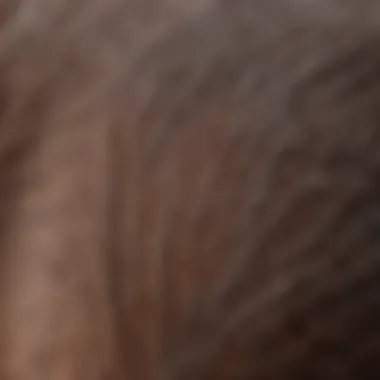Exploring Hair Thinning: Causes, Symptoms, and Treatments Unveiled


This comprehensive guide delves into the intricate world of hair thinning, dissecting its multifaceted causes, subtle symptoms, and diverse treatment possibilities. From elucidating the underlying factors contributing to hair thinning to discussing the signs individuals should remain vigilant of, this piece strives to equip readers with a comprehensive understanding of this prevalent concern.
Causes of Hair Thinning
Hair thinning can be a complex outcome resulting from various factors such as genetics, hormonal imbalances, nutritional deficiencies, and underlying medical conditions. Understanding these root causes is paramount in addressing and managing hair thinning effectively.
Genetic Predisposition
Individuals with a family history of baldness or hair thinning are more susceptible to experiencing similar issues due to inherited genetic traits. Exploring one's genetic predisposition to hair thinning can offer valuable insights into potential treatment approaches.
Hormonal Imbalances
Fluctuations in hormone levels, particularly dihydrotestosterone (DHT), can contribute to hair follicle miniaturization and eventual hair thinning. Balancing hormonal levels through medical interventions or lifestyle adjustments may help alleviate this imbalance.
Nutritional Deficiencies
Inadequate intake of essential nutrients such as vitamins, minerals, and proteins can compromise hair health, leading to thinning. Incorporating a well-rounded diet rich in essential nutrients is crucial for maintaining healthy and voluminous hair.
Symptoms of Hair Thinning
Recognizing the subtle signs of hair thinning early on can prompt timely intervention and prevent further progression of the condition. From increased hair shedding to noticeable changes in hair texture and density, being vigilant of these symptoms is key.
Increased Hair Shedding
Experiencing a higher-than-usual amount of hair fall during activities like washing or brushing can indicate potential hair thinning. Monitoring changes in hair shedding patterns can provide valuable insights into the progression of the condition.
Changes in Hair Texture
Noticing alterations in the texture of the hair, such as thinning strands or reduced volume, may signify the onset of hair thinning. Observing these textural changes can serve as an early indicator of underlying concerns.
Treatment Options for Hair Thinning
Addressing hair thinning effectively necessitates a tailored approach that considers the individual's underlying causes, severity of thinning, and treatment preferences. From topical solutions to oral medications and invasive procedures, a wide array of treatment options exists to combat hair thinning.
Topical Treatments
Topical solutions like minoxidil and finasteride can help stimulate hair growth and prevent further thinning by targeting the hair follicles directly. Consistent application of these treatments is essential for optimal results.
Oral Medications
Prescription medications like finasteride can aid in reducing DHT levels in the scalp, thereby promoting hair regrowth and halting thinning. Consulting a healthcare provider for personalized medication recommendations is crucial.


Surgical Interventions
For individuals seeking more permanent solutions, surgical interventions such as hair transplants offer a reliable method of restoring hair density in thinning areas. Understanding the nuances of these procedures is vital in making informed treatment decisions.
Synthesizing the diverse information presented throughout, this guide aims to empower individuals with a comprehensive understanding of hair thinning, from its intricate causes and subtle symptoms to a spectrum of treatment options available in the journey towards healthier, fuller hair.
Introduction to Hair Thinning
Hair thinning is a topic of utmost significance in the realm of hair health and overall personal well-being. Understanding the intricacies of hair thinning can shed light on various factors contributing to this common issue that affects individuals worldwide. This section aims to delve deep into the reasons behind hair thinning, its visible indications, and most importantly, the available treatment options that individuals can explore to address this concern effectively.
Defining Hair Thinning
Understanding the concept of hair thinning
An essential aspect of comprehending hair thinning is recognizing the gradual reduction in the diameter of individual hair strands. This phenomenon contributes significantly to the overall volume and thickness of one's hair. By exploring the various reasons behind this occurrence, individuals can better grasp the complexities of hair health and maintenance, crucial for addressing thinning effectively. Understanding the concept of hair thinning allows readers to discern the nuances between normal hair shedding and concerning thinning, offering valuable insights into personalized hair care routines.
Distinguishing between hair thinning and hair loss
Distinguishing between hair thinning and hair loss is pivotal in diagnosing and treating hair-related concerns accurately. While hair thinning reflects a decrease in hair shaft diameter, hair loss entails a noticeable reduction in overall hair density. By highlighting the disparities between these conditions, individuals can adopt targeted approaches to manage their specific hair problems, thus enhancing the overall health and vitality of their hair. Recognizing the nuances between hair thinning and hair loss is essential for developing tailored strategies to address these issues effectively for improved confidence and well-being.
Significance of Hair Thickness
The importance of hair thickness for overall appearance
Hair thickness plays a pivotal role in defining one's overall appearance and confidence levels. The volume and density of the hair contribute significantly to a person's aesthetic appeal and self-perception. Understanding the significance of hair thickness can empower individuals to adopt appropriate care routines and treatments to maintain and enhance the fullness of their hair, promoting a positive self-image and enhanced quality of life.
Impact of thinning hair on self-esteem
Thinning hair can have profound implications on an individual's self-esteem and emotional well-being. The visible effects of hair thinning may lead to feelings of self-consciousness and diminished confidence, impacting various aspects of daily life. Addressing the impact of thinning hair on self-esteem is crucial in providing holistic care solutions that not only target the physical aspects of hair health but also nurture mental and emotional resilience. By understanding the emotional toll of thinning hair, individuals can seek appropriate support and treatments to regain confidence and maintain a positive self-image.
Causes of Hair Thinning:
Genetic Factors:
Role of genetics in hair thinning: Genetic predispositions play a significant role in hair thinning, influencing the patterns and severity of hair loss experienced by individuals. By delving into the genetic underpinnings of hair health, this article aims to elucidate how inheritance can impact the thickness and density of one's hair. Understanding the genetic component of hair thinning is essential for implementing personalized treatment approaches tailored to individual needs.
Understanding hereditary hair loss: Hereditary hair loss, often driven by genetic factors, is a condition that affects a large portion of the population. Exploring the nuances of hereditary hair loss allows readers to grasp the hereditary patterns and potential risk factors associated with this type of hair thinning. By recognizing the genetic aspects of hair loss, individuals can better navigate treatment options and management strategies suited to their genetic makeup.
Hormonal Imbalance:
Effects of hormonal changes on hair thickness: Hormonal fluctuations can profoundly impact the thickness and quality of hair. By examining how hormonal imbalances contribute to hair thinning, this section aims to clarify the intricate relationship between hormonal activity and hair health. Understanding the effects of hormones on hair thickness empowers readers to address underlying hormonal issues that may be exacerbating hair thinning.


Conditions like PCOS and thyroid disorders impacting hair health: Medical conditions such as PCOS and thyroid disorders can disrupt hormonal balance, leading to adverse effects on hair health. By discussing how these specific conditions impact hair thickness and quality, this article provides insights into the interconnected nature of hormonal health and hair condition. Recognizing the influence of such conditions is essential for developing targeted interventions to mitigate their effects on hair thinning.
Nutritional Deficiencies:
Impact of inadequate nutrition on hair growth: Poor nutrition can compromise hair growth and contribute to hair thinning over time. Exploring the impact of nutritional deficiencies on hair health highlights the importance of a well-rounded diet in supporting robust hair growth. Addressing deficiencies in essential nutrients can be pivotal in promoting healthy hair and preventing further thinning.
Essential vitamins and minerals for healthy hair: Certain vitamins and minerals play a crucial role in maintaining optimal hair health and thickness. By emphasizing the significance of specific nutrients for hair growth, this section underscores the vital role that nutrition plays in combating hair thinning. Incorporating a diverse array of essential vitamins and minerals into one's diet can significantly impact the overall health and appearance of hair.
Symptoms of Hair Thinning
In this article, the discussion on 'Symptoms of Hair Thinning' holds paramount significance as it serves as a crucial indicator of underlying issues related to hair health. By paying attention to the symptoms, individuals can proactively address potential concerns before they escalate, emphasizing the importance of early detection and intervention. Understanding these symptoms aids in optimizing personalized treatment plans and enhancing overall well-being. Notably, being able to recognize visible indications and texture changes is pivotal in managing hair thinning effectively.
Visible Indications
Thinning along the hairline
Thinning along the hairline stands out as a prevalent symptom of hair thinning, showcasing a gradual reduction in hair density along the frontal area. This particular manifestation often signifies the initial stages of thinning, alerting individuals to seek timely assistance. The distinctive feature of thinning along the hairline lies in its visibility, making it a prominent identifier for those monitoring their hair health. Although concerning, this symptom's early identification enables proactive measures to maintain and potentially improve hair density, enhancing the well-rounded coverage of this article.
Decreased hair density
Conversely, decreased hair density serves as a subtle yet telling sign of hair thinning, focusing on the overall volume and thickness of the hair. This symptom sheds light on the gradual reduction in the number of hair strands per given area, reflecting the weakening of hair follicles. Through understanding the implications of decreased hair density, individuals can delve deeper into the root causes of their thinning hair, paving the way for targeted treatment strategies. While this symptom's subtlety may pose challenges in initial detection, its detailed exploration contributes significantly to the holistic understanding of hair thinning within the context of this article.
Texture Changes
Understanding alterations in hair texture
The aspect of understanding alterations in hair texture serves as a pivotal component in identifying hair thinning patterns. Changes in texture encompass variations in the coarseness, smoothness, or brittleness of the hair strands, offering valuable insights into the overall health of the hair. Recognizing these alterations provides essential clues regarding the underlying causes of hair thinning, aiding in the customization of effective treatment approaches. Delving into the specifics of texture changes enriches the readers' comprehension of the multifaceted nature of hair thinning, adding depth and nuance to the informational landscape of this article.
Effect of thinning on hair manageability
Exploring the effect of thinning on hair manageability delves into how changes in hair thickness impact styling and maintenance routines. Thin and weakened hair strands pose challenges in styling efforts, affecting the overall manageability and versatility of hair. By addressing the implications of reduced hair manageability, individuals can adapt their grooming practices to accommodate the changing needs of their hair. This segment elucidates the practical implications of hair thinning, offering a practical perspective on mitigating its effects and fostering optimal hair care practices within the overarching theme of this article.
Treatment Options for Hair Thinning
Hair thinning can be a distressing issue for many individuals, affecting their confidence and self-image. In this section, we delve into the crucial topic of treatment options aimed at addressing and potentially reversing hair thinning. Understanding the available strategies is essential for those seeking to combat this common concern. By exploring the various avenues for treatment, individuals can make informed decisions regarding their hair health.
Topical Treatments
Utilizing minoxidil for hair thinning
When it comes to combating hair thinning, minoxidil emerges as a prominent solution. Its ability to stimulate hair follicles and promote regrowth is a key characteristic that sets it apart in the realm of topical treatments. Minoxidil's effectiveness in improving hair density and thickness makes it a popular choice among individuals grappling with thinning hair. However, like any treatment, minoxidil also comes with its own set of advantages and disadvantages that need to be weighed carefully.


Effectiveness of topical treatments
The effectiveness of topical treatments for hair thinning cannot be overstated. These formulations play a pivotal role in nourishing the scalp and revitalizing hair follicles, aiding in the restoration of hair thickness. Their ease of application and targeted approach make them a preferred choice for many individuals combating hair thinning. Yet, understanding the unique features of different topical treatments is crucial in determining their suitability and potential drawbacks in addressing this concern.
Nutritional Supplements
Role of biotin in promoting hair growth
Biotin, known for its role in supporting hair, skin, and nail health, plays a significant part in promoting hair growth. Its ability to strengthen hair strands and improve resilience makes it a sought-after supplement for individuals experiencing hair thinning. Incorporating biotin into a daily hair care routine can potentially enhance hair quality and combat thinning effectively. However, like any supplement, understanding the nuances of biotin and its impact is key to maximizing its benefits.
Importance of a balanced diet for healthy hair
A balanced diet forms the foundation for healthy hair growth. Essential nutrients obtained through a well-rounded diet contribute immensely to the vitality and thickness of hair. Ensuring the right intake of vitamins, minerals, and proteins is fundamental in addressing and preventing hair thinning. While nutritional supplements can aid in meeting specific deficiencies, a holistic approach that emphasizes a balanced diet is paramount for long-term hair health.
Medical Interventions
Hair transplant procedures
For individuals seeking more permanent solutions to hair thinning, hair transplant procedures offer a promising option. The precision of modern hair transplant techniques allows for natural-looking results that can significantly enhance hair density. Understanding the intricacies of hair transplant procedures is crucial in deciding whether this intervention aligns with personal expectations and goals for addressing hair thinning.
Consulting dermatologists for advanced solutions
Dermatologists specializing in hair health can provide advanced solutions tailored to individual needs. Their expertise in diagnosing hair-related issues and recommending personalized treatments is invaluable for those tackling persistent hair thinning. Partnering with a dermatologist can open up access to a range of advanced solutions beyond topical treatments and supplements, offering comprehensive care for addressing multifaceted hair thinning concerns.
Preventive Strategies for Hair Thinning
In the realm of hair care, implementing preventive strategies for hair thinning constitutes a pivotal aspect that individuals should undeniably prioritize. Understanding these preventive measures serves as a proactive approach to maintaining optimal hair health and avoiding potential issues associated with hair thinning. By delving into preventive strategies for hair thinning, individuals equip themselves with the knowledge and tools necessary to safeguard the thickness and vitality of their hair strands. This section elucidates the significance of such preventive actions in the broader context of this article, emphasizing their role in fortifying hair resilience and overall well-being.
Scalp Care Practices
Benefits of regular scalp massages
Exploring the benefits of incorporating regular scalp massages into one's hair care routine unveils a holistic approach to nurturing hair health. These gentle massages stimulate the scalp's microcirculation, consequently promoting hair follicle nourishment and enhancing hair growth. The key characteristic of regular scalp massages lies in their ability to improve blood flow to the hair roots, facilitating the delivery of essential nutrients and oxygen for robust hair development. This practice stands out as a preferred choice within this article due to its proven efficacy in rejuvenating hair follicles and revitalizing hair texture. Embracing this unique feature of scalp massages offers individuals a natural and non-invasive method to strengthen hair strands and promote overall hair quality, making it a valuable addition to any comprehensive hair care regimen.
Choosing gentle hair care products
Selecting gentle hair care products emerges as a crucial consideration in maintaining healthy hair and preventing thinning issues. The key characteristic of these products lies in their mild formulas, free from harsh chemicals and irritants that can compromise hair quality. Opting for gentle hair care products aligns with the ethos of this article by advocating for practices that prioritize hair wellness and vitality. The unique feature of such products lies in their ability to cleanse and nourish hair effectively without stripping away essential oils or causing undue damage. Their advantage in this article stems from their role in maintaining a conducive scalp environment for robust hair growth, underscoring the importance of gentle care in preserving hair thickness and strength.
Stress Management Techniques
Incorporating mindfulness practices into daily routine
Integrating mindfulness practices into one's daily routine represents a transformative approach to alleviating stress and fostering overall well-being, including hair health. The key characteristic of mindfulness lies in its capacity to cultivate present-moment awareness and emotional resilience, countering the detrimental effects of chronic stress on the body, including hair thinning. Within the scope of this article, the unique feature of mindfulness practices emerges as a powerful tool for mitigating stress-related hair issues and improving overall hair condition. Embracing mindfulness not only enhances mental clarity and emotional balance but also contributes to the restoration of hair vitality and thickness.
Effect of stress reduction on hair health
Exploring the profound impact of stress reduction on hair health underscores the integral connection between mental well-being and hair condition. The key characteristic of stress reduction techniques lies in their ability to regulate hormone levels and mitigate the physiological effects of stress on hair follicles. This consideration aligns with the overarching goal of this article by emphasizing the importance of addressing stress as a critical factor influencing hair thinning. The unique feature of stress reduction interventions lies in their comprehensive approach to enhancing both mental and physical aspects of well-being, ultimately reflecting positively on hair quality and resilience within the context of this detailed narrative.













